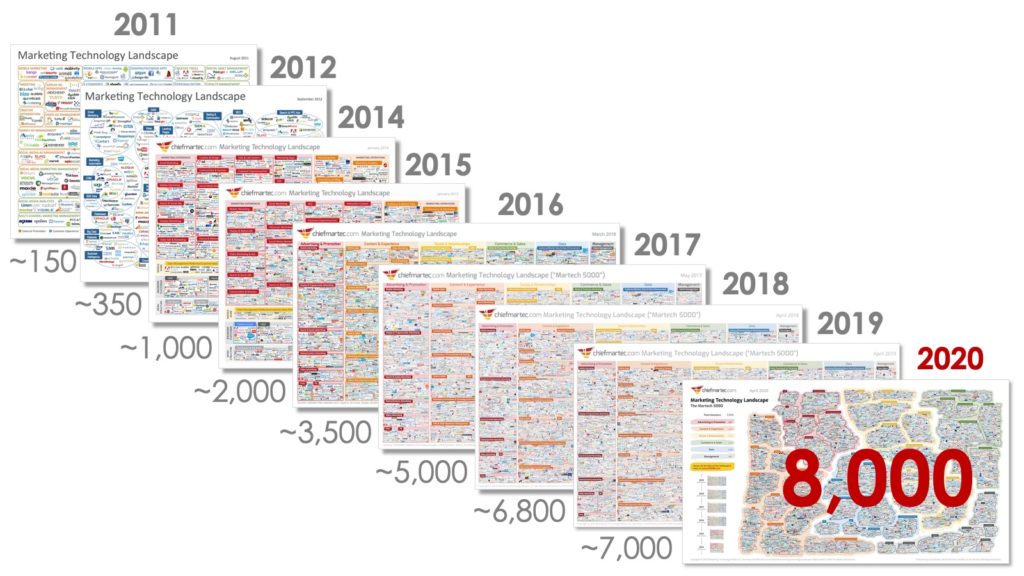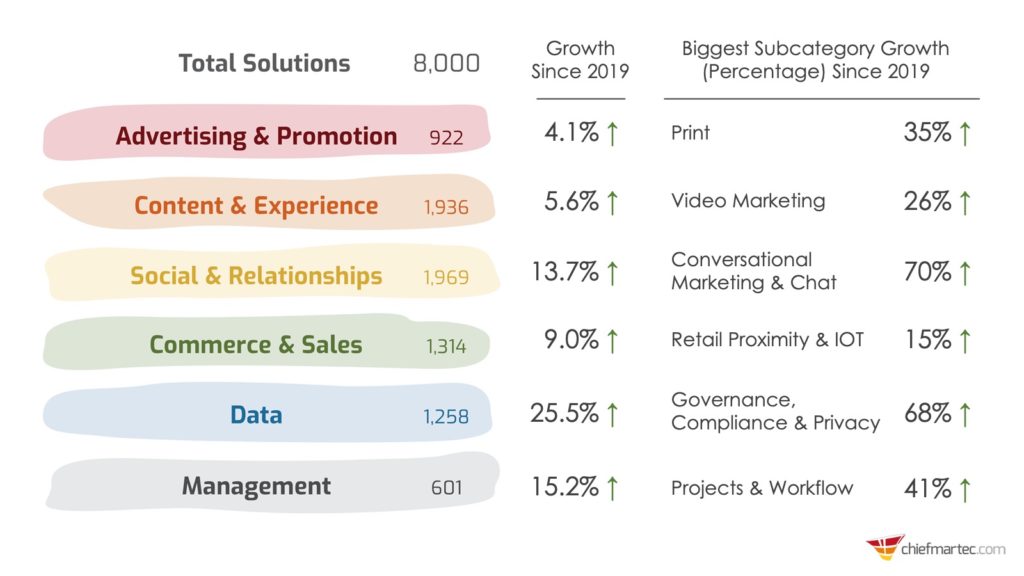In the last few years, the word “martech” has been dominating the technology space. It is one of the most rapidly growing sectors, and for good reason. It has helped completely transform the way Marketing departments operate, and has helped push forward technological innovations in the workplace. However, anyone who has seen the martech landscape supergraphic knows that the martech field is a complex one.
At Saas Advisor, our mission is to help our clients get the most out of their martech to support them in their business goals. That is why we are giving you a short rundown of the common question: What is martech?
Today we will answer the following questions:
Let’s get started.
What is Martech?
Martech is just the abbreviation for marketing technology, and it is exactly what it sounds like: the convergence of marketing and technology. Most times, when we are talking about martech, we are talking about the software platforms dedicated to Marketing. Think MailChimp, Sprinklr, Hubspot, etc. These are all great examples of Martech. They provide a function to help marketers do their jobs more efficiently.
However, while martech may seem simple enough, there is a lot that goes into it. According to Scott Brinker, one of the leading authorities on Martech, it’s definition is as follows: “Martech applies to major initiatives, efforts and tools that harness technology to achieve marketing goals and objectives”. That means that it goes beyond just software. Strategies, professions, and organizations have all been created around this idea of marketing technology. Saas Advisor is a great example of that.
If you use a martech software, chances are that you use more than one. The name for the ecosystem of all of your martech tools is a martech stack or marketing stack. Marketing stack generally refers to the “stacking” of different marketing (or martech) software solutions that are more or less connected to each other and can be used by a company.
Marketers use it to perform, analyze, and improve their services. Martech stacks are increasingly more prevalent and relevant to the way businesses work. In fact, the overall average is 88 solutions per stack, having grown 22% over the past four years. (Source: Chiefmartech)
How Has Martech Grown?
+5,233%. This is the growth rate of the number of SaaS marketing technology companies between 2011 and 2020! The huge wave of digital transformation across industries has helped bolster this growth. In marketing departments, the budget allocated to technology has grown as well. As of 2019, technology represents 29% of marketing budgets. It is currently the largest area of marketing investment , and the only one in growth! Other marketing budget allocations include: 23% Media, 23% Agency, and 24% Labor.
Take a look at how martech has grown over the last few years:

There are over 8,000 martech solutions recognized today (not including new startups), compared to just 150 in 2011! Here is a breakdown of what some of those solutions do:

As you can see, the market growth does not seem to be slowing down. However, do to this enormous rise, some challenges have arose for businesses.
What are Some of the Challenges?
Even with this exponential growth, there are some serious challenges that have arisen due to martech. There are some key realities that show us a lack of confidence that marketing departments have in their marketing stacks:
- Disappointments: 83% of marketing professionals have changed at least one of their marketing tools in the past year*
- Unnecessary expenses: Professionals use only 61% of the features in their marketing stack**
- An overall uncertainty about what to do to improve performance: In 2020, 24% of marketing directors believe that managing their marketing stack is among the 3 biggest weaknesses in their company’s customer acquisition and retention***
*Change of provider or replacement of an internal tool by a third party platform – Martech Replacement Survey 2020, Martech Today
**Marketing Technology Survey 2018, Gartner
***CMO Spend Survey 2019–2020, Gartner
This has led to five crucial issues that organizations must address:
- Understand and consider how to use the tool in order to build a strategic roadmap
- Identify the tools that will perfectly meet the objectives of your strategy
- Standardize the practices of employees who will use the tools in order to guarantee their use
- Optimize the expenses allocated for marketing tools
- Ensure data security and compliance
Faced with these issues, our founders at Saas Advisor knew there needed to be a resource for companies to resolve them. That is why we accompany you every step of the way in building your marketing stack by helping you translate your strategies into operational realities. We help make your technology the ally of your performance. Interested in discussing your project with us?
Why Does Martech Matter?
Martech matters because it is changing how we do business, and how we spend money. On top of that, it is only getting bigger! Why is this happening? Because of the benefits.
Historically, many departments have had a limited overview of interactions with customers and limited access to data. This meant that it was difficult for all departments to work cohesively to optimize the customer journey and experience. That has all changed with the arrival of martech. Business can now adopt solutions that give them a centralized platform to hold all of their data, allowing all departments to get a better understanding of the marketing process as well as the “big picture” of their organization as a whole.
Marketers now have the opportunity to have a holistic view of their customers, and can understand the interactions through every step of the customer lifecycle. This allows them to gather valuable insights to decide on how to improve, change, strategize, and engage better with their customers.
Other important benefits include:
- MarTech unites marketing and other departments. Marketing departments are not the only ones implicated when it comes to martech. For example, there must be a collaboration between marketing and operations departments because they are working with the same data. With clear goals and real-time data to help make decisions, these departments can determine what efforts are working and where opportunities lie. Additionally, in many cases, sales teams will use the same software as marketing teams. Having a clear, holistic view of their customer journey allows sales and marketing teams to align together to provide the best experience for their customers.
- Martech allows you to do more, faster. By automating repetitive and time-consuming manual tasks, marketing teams can streamline workflows and do more with less. By automating these processes, marketers can focus on creating content, campaigns, and more. This extra time allows marketers to focus more on personalization of their offers and campaigns to help strengthen customer relationships, loyalty, and lifecycle.
- Martech helps you build better relationships with your customers. Martech solutions like CRM and Social Listening platforms allow you to strengthen the relationships between you and your customers due to the simple access to past conversations, interactions, subscription information, personal information, and more. Not to mention you can interact with your customers directly from platforms to connect with your customers quickly and effectively.
Martech is a big, ambiguous thing that continues to grow and change at a rapid pace. It is important that companies understand that more does not always mean better when it comes to technology, and that strategy and usage are equally important. If you want to learn more about this, don’t hesitate to reach out to us and we would be happy to discuss your project. Additionally, if you want to stay up-to-date with the martech sector, sign up for our newsletter, Martech Insider!
Looking for another article?
Check out our explanation of CRM to get a better understanding of what it can do for your business – and how we can help!
Interested in discussing your project?





